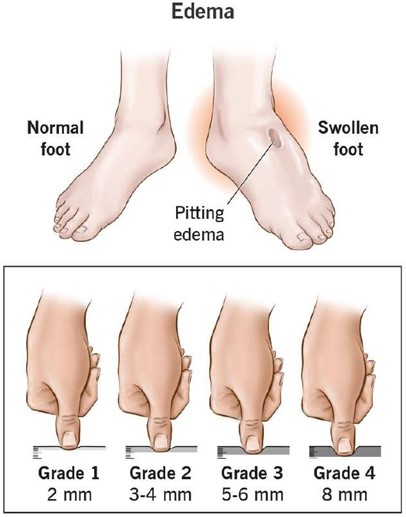A nurse is assessing a school-age child who has heart failure and is taking furosemide.
Which of the following findings should the nurse identify as an indication that the medication is effective?
decrease in peripheral edema.
decrease in cardiac output.
increase in venous pressure.
increase in potassium levels.
The Correct Answer is A
A decrease in peripheral edema is an indication that the furosemide medication is effective.

Furosemide is a diuretic that helps to reduce fluid buildup in the body, including peripheral edema, which is a common symptom of heart failure.
Choice B is wrong because furosemide does not directly decrease cardiac output.
Choice C is wrong because furosemide does not increase venous pressure.
Choice D is wrong because furosemide can actually cause a decrease in potassium levels, not an increase.
Nursing Test Bank
Naxlex Comprehensive Predictor Exams
Related Questions
Correct Answer is C
Explanation
Continuous swallowing can be an indication of hemorrhage following a tonsillectomy and adenoidectomy.
This is because the child may be swallowing blood that is coming from the surgical site.
Choice A is wrong because a blood pressure of 95/56 mm Hg is within the normal range for a 5-year-old child.
Choice B is wrong because a heart rate of 54/min is within the normal range for a 5-year-old child.
Choice D is wrong because flushing of the face is not an indication of hemorrhage following a tonsillectomy and adenoidectomy.
Correct Answer is C
Explanation
According to UCSF Benioff Children’s Hospital Oakland Orthopaedic Department, you can change your baby’s diaper with the Pavlik harness in place and make sure the straps are kept outside of the diaper.
Choice A is wrong because while your child is being treated in the Pavlik harness, it is very important that you do not remove the harness or adjust the straps, unless you are given specific instructions by your doctor to do so.
Choice B is wrong because there are no instructions to apply lotion to the skin under the straps.
Choice D is wrong because the duration of treatment will be determined by your doctor and may vary.
Whether you are a student looking to ace your exams or a practicing nurse seeking to enhance your expertise , our nursing education contents will empower you with the confidence and competence to make a difference in the lives of patients and become a respected leader in the healthcare field.
Visit Naxlex, invest in your future and unlock endless possibilities with our unparalleled nursing education contents today
Report Wrong Answer on the Current Question
Do you disagree with the answer? If yes, what is your expected answer? Explain.
Kindly be descriptive with the issue you are facing.
